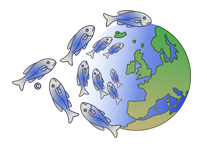

Actinothoe sphyrodeta is an anemone that reaches 3 cm in diameter.
It has up to 140 short, pointed, fully retractable white tentacles. The oral disc can be white or orange, in this case this sea anemone evokes daisy flowers.
The 5 cm high column with a diameter of 2 cm is alternately adorned with opaque white and translucent gray longitudinal bands. When disturbed many
aconties are issued from the column. Actinothoe sphyrodeta has two modes of reproduction, one sexual allows the species to spread,
the other asexual, by longitudinal fissions, allows this anemone to duplicate quickly and cover large areas.
White-striped anemones are frequently encountered in groups, they can cover large areas.
It lives fixed on the rocks, in particular on vertical surfaces along with Corynactis viridis, on wrecks, and on kelp.
Actinothoe sphyrodeta lives between 0 and 40 meters deep in the North-East Atlantic, from the British Isles to Portugal and the English Channel. It could be locally present in the western Mediterranean.
Source : World Register of Marine Species
Biota (Superdomain)
Animalia (Kingdom)
Cnidaria (Phylum)
Anthozoa (Subphylum)
Hexacorallia (Class)
Actiniaria (Order)
Enthemonae (Suborder)
Metridioidea (Superfamily)
Sagartiidae (Family)
Actinothoe (Genus)
Actinothoe sphyrodeta (Species)
Retractile - Retract : action allowing the anemone to contract, the tentacles are then hidden.
Aconties : filamentous structures bearing stinging cells playing an offensive and defensive role.
Longitudinal fission : very common mode of reproduction in Actinarians leading the anemone to cut into two individuals of sometimes unequal size in a few hours.
Kelp : large algae living below the tidal area.
Text : Wilfried Bay-Nouailhat, Anne Bay-Nouailhat © 2005 - 2026.
Photos : ©
Wilfried Bay-Nouailhat, Jean-Michel Crouzet. Published with their kind permission.
Websites and reference works : Consult bibliography
Image satellite: © Esri, DigitalGlobe, GeoEye, Earthstar Geographics, CNES/Airbus DS, USDA, USGS, AeroGRID, IGN, and the GIS User Community.
Données de distribution : Actinothoe sphyrodeta (Gosse, 1858) in GBIF Secretariat (2019). GBIF Backbone Taxonomy. Checklist dataset https://doi.org/10.15468/39omei accessed via GBIF.org on 2026-03-05.
Source : World Register of Marine Species
Biota (Superdomain)
Animalia (Kingdom)
Cnidaria (Phylum)
Anthozoa (Subphylum)
Hexacorallia (Class)
Actiniaria (Order)
Enthemonae (Suborder)
Metridioidea (Superfamily)
Sagartiidae (Family)
Actinothoe (Genus)
Actinothoe sphyrodeta (Species)
Retractile - Retract : action allowing the anemone to contract, the tentacles are then hidden.
Aconties : filamentous structures bearing stinging cells playing an offensive and defensive role.
Longitudinal fission : very common mode of reproduction in Actinarians leading the anemone to cut into two individuals of sometimes unequal size in a few hours.
Kelp : large algae living below the tidal area.
Text : Wilfried Bay-Nouailhat, Anne Bay-Nouailhat © 2005 - 2026.
Photos : ©
Wilfried Bay-Nouailhat, Jean-Michel Crouzet. Published with their kind permission.
Websites and reference works : Consult bibliography
Bay-Nouailhat W., Bay-Nouailhat A., May 2005, Description of Actinothoe sphyrodeta, [On line] https://european-marine-life.org/05/actinothoe-sphyrodeta.php, consulted on 2026 March 05.
Authors

Plongeur - Naturaliste
Photographe Sous-Marin

Chargée d’études en environnement marin
Plongeuse professionnelle - Naturaliste
© Mer et littoral 2004-2026 - All rights reserved
The texts and images on this website are not free of rights and cannot be copied and/or used without the agreement of their respective authors.